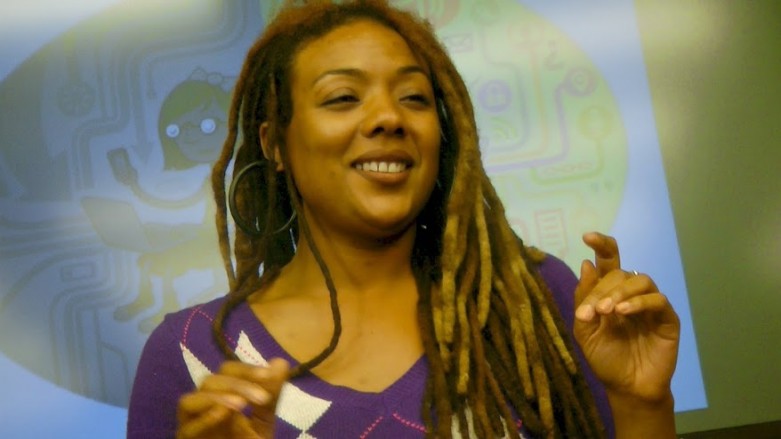
Bay Area Speaks: 'Net Neutrality Is Free Speech'
On Thursday night, the skies were overcast in San Francisco and threatening to storm. A group of 50 Net Neutrality supporters standing on the steps of San Francisco City Hall adjusted their signs and opened their umbrellas as it began to pour. The group held out, chanting “Fair communication, no discrimination!”
Then a wall of advancing figures appeared on the horizon, marching toward City Hall. They were protesters decrying the murders of 43 Mexican students. The Net Neutrality activists welcomed them into their midst.
The Net Neutrality rally was one of many held during this year of protest against FCC Chairman Tom Wheeler’s proposal to allow discrimination online. Free Press organized Bay Area Speaks with ColorOfChange.org, Common Cause, the Electronic Frontier Foundation, the Media Action Grassroots Network (MAG-Net) and the Media Alliance.
A giant suit cutout labeled “I$P” held a briefcase with the words “Net Profit,” and a projector lit up the face of City Hall with Internet emergency signs.
The Net Neutrality crew and the Mexican-solidarity protesters took turns sharing the microphone. Common themes resonated: People spoke of being tired of corruption and greed. Activists from both groups emphasized the need to protect the open Internet to speak truth to power and organize. “Let information flow down like rain!” yelled Electronic Frontier Foundation Activist April Glaser.
At 7 p.m., the rally transitioned into a speakout on Net Neutrality inside City Hall. A standing-room-only crowd of more than 100 people packed the room, with some attendees leaning against the wall or sitting on the floor. The first speaker, former FCC Commissioner Michael Copps, underscored the connection between an open Internet and other issues people are fighting for. “Every issue we care about depends upon getting our media right and keeping our media open,” he said.
With the FCC’s proposal, he added, “We’re about to take history’s most dynamic tool ever, that should be ushering us into a golden age of innovation, and turning it over to the gatekeepers and industry consolidators. Didn’t we see radio and television go down that road?”
Rebecca Kaplan of the Oakland City Council said that the Internet “has been our commons, our free speech.” Wheeler’s proposal, which would let Internet service providers create fast lanes online, would destroy all that.
“If you’re a millionaire talking in the town square, you can shout,” Kaplan said, “but if you’re a poor person, you have to whisper . … We are not going to allow the Internet to be divided up into haves and have-nots.”
“The Internet is not a luxury,” said librarian Amy Sonnie of the Oakland Public Library. “It’s a lifeline, a vital resource for people in need.”
Ana Montes of The Utility Reform Network — and many others — discussed the need for the FCC to reclassify broadband providers as common carriers under Title II of the Communications Act. This is the only way, she noted, for companies like Comcast to “be held accountable to the public interest.”
Many attendees talked about the implications of Net Neutrality for speech and democracy. “Net Neutrality is free speech. A slower Internet is a less usable Internet,” said one participant.
“The Internet is the 21st-century printing press, and I’m not giving up my printing press,” said another.
Malkia Cyril of MAG-Net noted that the open Internet brings to light stories that mainstream outlets overlook. “It took 1 million tweets,” Cyril said, “before the media covered [Ferguson].”
The Internet’s capacity to connect people with something bigger than themselves kept coming up. “The Internet opened the world up,” said one attendee, “but now I’m imagining, without Title II protection, we’ll be stuck in this little pool again, reduced to sipping at the world through a tiny straw.”
Mel, who is deaf, talked about how the open Internet has helped him find a community. “When I was three or four, I didn’t even know there were other deaf people in the world,” he said. “I didn’t have a language. When you look at deaf children now, things are really changing. They’re building their confidence, they’re becoming more articulate, they’re able to be themselves in the world.”
These are just some of the powerful statements made during Bay Area Speaks. Click here for the video of the full event.
The event in San Francisco comes on the heels of people’s hearings we’ve organized with our allies in New York City and Texas. The message at these events and others we’ve held is the same: The FCC needs to protect the open Internet, and reclassifying broadband providers as common carriers is the only way to accomplish that.
Millions of people, countless businesses and organizations, leaders in Congress and the president have all called on the FCC to reclassify. The FCC has all the information it needs to take action. Add your voice and urge the agency to do the right thing.
Scroll through our Bay Area Speaks photos below (credit: Peter Menchini).









